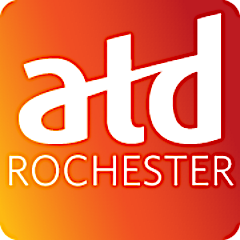Our Amazing Brains – Adventures in Lifelong Learning
Presentation by Suzanne Choma, SC Performance Consulting
Suzanne described Astro Teller’s Graph about the Rate of Change in Technology over time and the human adaptability.
The thought is that if we put our collective intelligence together, we can change the adaptability curve, and we can achieve dynamic stability at some point.
Some interesting facts about our brains:
• In utero, 250,000 nerve cells are created every minute.
• An 8 month fetus’ brain weighs 1 pound and has two times the neurons of an adult
• In the final stages of fetal development, about half of the neurons die, leaving only the fittest.
• A 6 year old’s brain is about 90% of the volume of an adult brain – that last 10% is a huge part of learning.
• Childhood and adolescence is a prime time for learning, and forgetting.
• Parts of the brain mature at different rates, starting from the back of the brain to the front.
• The adult brain weighs approximately 3 pounds (try picking up a 3 pound bag of rice and you’ll be amazed!)
• Our brains shrink with age – approximately 5-10% in weight and 15-20% in volume between the ages of 20 and 90.
• The good news is that during this time of shrinking, our brains are forming and reforming new neural connections.
Some scientists’ thoughts about the future brain:
• By the year 2030, nanobots will connect our brain cells to the cloud.
• Humans will be a hybrid of biological and non-biological thinking.
• Neural Darwinism – Neural networks compete with each other. Those that get stimulated grow while others atrophy.
• Learning is how you acquire information about the world, and memory is how you store the information over time. `Erik R. Kandel
• Neuroplasticity is the key to lifelong learning.
• Brain Fitness Across a Lifetime – Keys to aging well.
o Eat well
o Exercise your mind and body regularly
o Sleep 7-8 hours a night and take naps
o Spend time in nature
o Play games
o Socialize and make new connections
o Find purpose
o Embrace technology
o Explore new territory
o Develop a magnificent obsession – one that you learn and share with others
Resources
• Brogard, Beritand Marlow, Kristian. The Superhuman Mind: Free the Genius in Your Brain. New York: Hudson Street Press, 2015
• Goleman, Daniel. Focus. New York: Harper Collins, 2013
• Kurzweil, Ray. How to Create a Mind. New York: Viking, 2012
• Medina, John. Brain Rules. Seattle: Pear Press, 2008
• Oakley, Barbara. A Mind for Numbers. New York: Penguin, 2014.
• Restak, Richard. Optimizing Brain Fitness. The Great Courses, 2011
• Friedman, Thomas. Thank You for Being Late. New York: Farrar, Straus and Giroux, 2016
• Sweeney, Michael S. Brain: The Complete Mind. Washington: National Geographic, 2009
